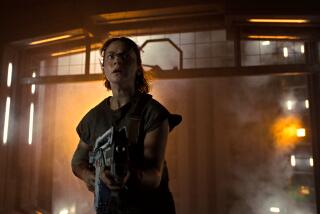‘Mission: Impossible -- Rogue Nation’: Five points worth knowing
- Share via
Some franchises become worn with age. Some get more complicated and suspenseful. The latter case could be made for “Mission: Impossible — Rogue Nation,” which contains the sort of elements that please both crowds and critics. [Warning: Spoilers within. Read at your own risk.]
Written and directed by Christopher McQuarrie (building on an earlier draft by Drew Pearce), the new Tom Cruise picture operates on several levels. McQuarrie began by writing the action scenes first, so the film has the feel of a series of large set pieces — note the “Manchurian Candidate”-esque opera house scene early on — but because he threads a sophisticated story through it, it never feels like action overload.
That plot, incidentally, isn’t easy to describe — basically, it concerns a chess match between the chaos-minded Syndicate and Tom Cruise’s Ethan Hunt (aided by his IMF team), with a wild card in Ilsa Faust (Rebecca Ferguson), a (possible) Syndicate insider or a (possible) British agent loyalist.
SIGN UP for the free Indie Focus movies newsletter >>
That’s the tip of a very large iceberg. Here’s how it lies in the water:
Flying high. You’ve no doubt heard about the wild Cruise plane stunt, both because it’s so visually striking — one of the world’s biggest movie stars dangling off the side of an Airbus A400 military aircraft — and because it’s been the center of Paramount’s promotional blitz. The irony is that for all the attention it’s received, the sequence takes place right at the start of the film and has only a cursory connection to what happens later. Perhaps even more notable is that the scene was not originally included at the beginning — in fact, in an earlier cut it was slotted into the very end of the film, a kind of epilogue that hinted at where Hunt’s next adventure would take him. The studio and McQuarrie decided that it made sense to move the scene all the way up, not least because they had relied on it so heavily to sell the movie.
Unusual suspect. There are few directors with the back story of McQuarrie. A wunderkind Oscar screenplay winner in his mid-20s for the 1995 sleeper “The Usual Suspects,” McQuarrie ended up in the Hollywood wilderness when he tried, and failed, to get numerous historical pictures made in the years that followed. (We delve into McQuarrie’s career at some length in this Sunday Calendar story). For a time, the filmmaker even thought about leaving the business. Things turned around, improbably, when in 2006 he met up with Cruise — who was also at a career low point after being fired by Paramount.
Cruise and McQuarrie would collaborate on “Valkyrie,” the WWII picture that McQuarrie wrote, rejuvenating each of their careers. McQuarrie would then go on to work with Cruise on numerous films, including the previous “M:I” picture, 2011’s “Ghost Protocol,” for which he served as a high-end script doctor. Cruise kept good-naturedly hectoring McQuarrie to direct the next Hunt adventure. During one late-night work session, he finally acquiesced.
Fergie. Unless you were an avid watcher of “The White Queen” on the BBC or took particular note of the supporting cast in Dwayne Johnson’s “Hercules,” you probably haven’t seen or thought much about Rebecca Ferguson before. That will change after this weekend, when Fergsuon announces her presence as Faust, an aptly named wheeler-and-dealer. The Swedish-British actress plays her character with a kind of smoky charm and cool intellect — helped by a script that, at least for a while, keeps you unsure whom she’s working for.
Ferguson is in many ways the opposite of what we often see in a movie like this, less the simple seductress or even the efficient action heroine (though she is at times the latter), and as much the piston on which the film fires.
McQuarrie realized he was going counterintuitive with the actress. As he describes the casting process: “Tom and I were really struggling because we couldn’t find someone who both had the chemistry with him and who was right for marketing, which wanted something specific physically. The other problem was we didn’t know who the woman was — the character kept shifting, and the actress was going to determine the role as much as the role was going to determine the actress.”
He continued, “And then we saw this audition from Rebecca, who in many ways is the opposite of what we were looking for — of what marketing needed. And yet Tom and I looked at each other and said ‘That’s her’ …. You believe in that role because you believe she’s had experience. You believe she can hold her own. A lot of people have commented how much they appreciate that it’s a woman, not a girl playing out of her league.”
Calling action. There’s much to process and debate about the plot, which functions with a kind of interlocking complexity — “like a Swiss watch,” Cruise called it in an interview. But the action is what brings fans in. And there’s plenty of it. Never mind the plane — there’s the opera house scene, an elaborate and classically shot sequence in Vienna that features multiple assassins, a chase scene atop scaffolding, a roof-set escape, a bunch of nifty gizmos, a killer performance of “Turandot” and a concluding car chase for good measure.
The question is which action set piece is most distinct. Competition comes from a motorcycle chase in Morocco, a car chase in Morocco and a showdown in British parliamentary realms. (There’s also, in a less action-y vein, a notable riff on the “Your mission, if you choose to accept it” meme.) But the film’s pièce de résistance may be an underwater action scene that features some poetic swimming and breath-holding, and slows the movie down to a more quiet, coiled pace. Sometimes you need a little silence to make the most noise.
Future Man. Cruise has said the next “Mission” — the sixth in the film series — could shoot as early as next summer. Of course, both the script and director need to be set, and this movie has to do well enough to justify a Paramount greenlight in the first place. If it did, what direction would a new movie go? There’s a self-contained quality to this film that allows plenty of choice, though the climax does hint in a new direction. It’s worth noting here too that Hunt was supposed to pass the baton to Jeremy Renner’s William Brandt at the end of the last movie. But after some of the scenes were shot, the production switched gears midway through to keep Cruise’s Hunt at the helm. The screenwriter who flew in to help make that happen? Chris McQuarrie.
Follow @ZeitchikLAT
MORE:
Review: Once again, Tom Cruise accomplishes the near-impossible in ‘Rogue Nation’
Director Christopher McQuarrie’s unlikely path to ‘Mission: Impossible – Rogue Nation’
Alibaba Pictures investing in Paramount’s ‘Mission: Impossible -- Rogue Nation’
More to Read
Only good movies
Get the Indie Focus newsletter, Mark Olsen's weekly guide to the world of cinema.
You may occasionally receive promotional content from the Los Angeles Times.











